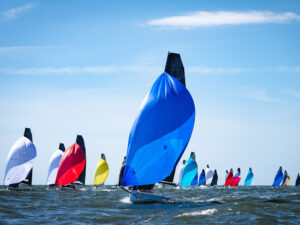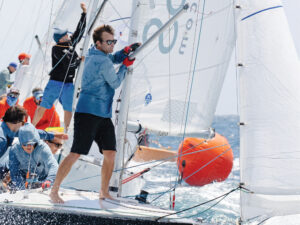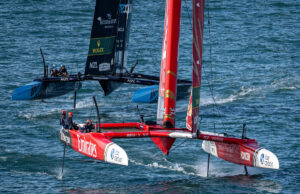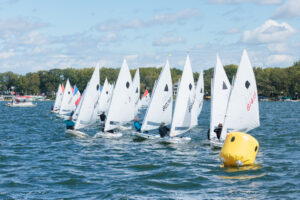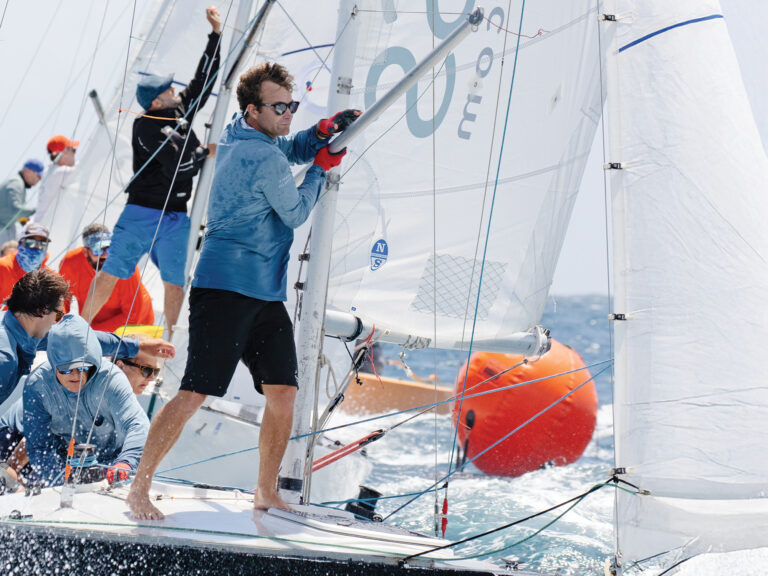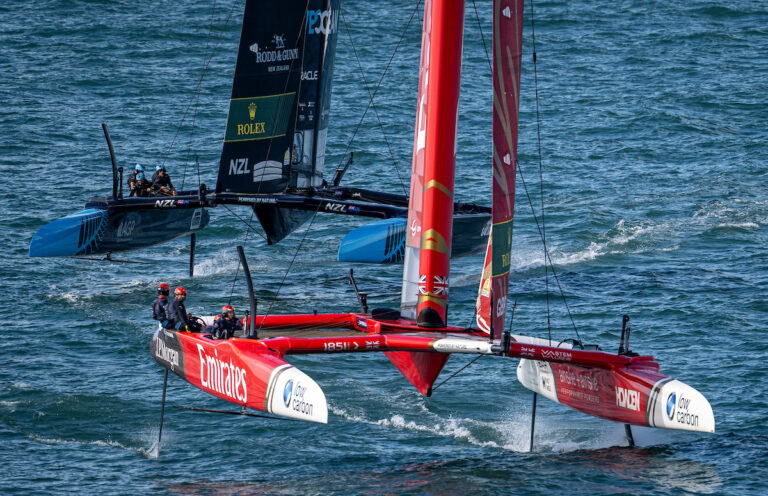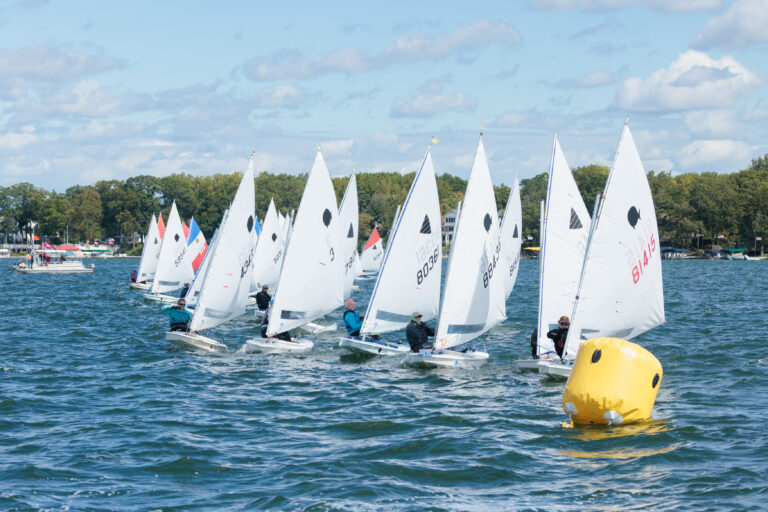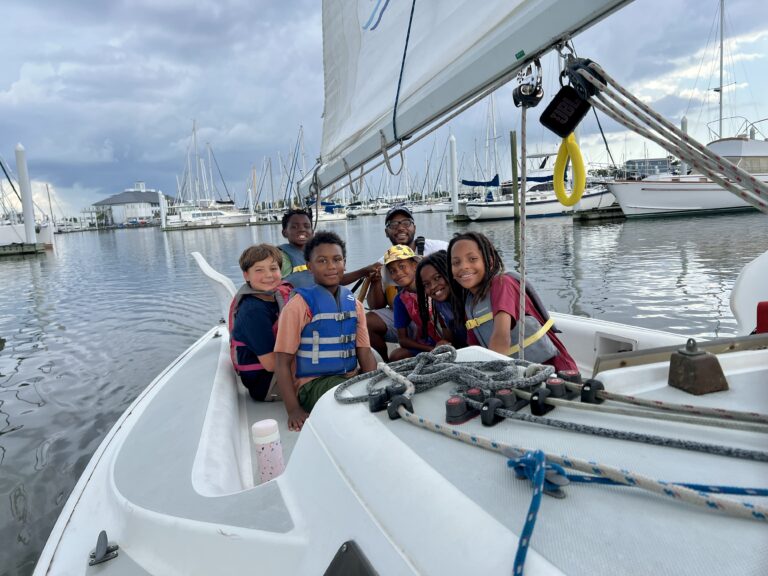
Our local Tasar fleet is pretty competitive, and the Scamania Coves Regatta this past summer was no exception. An intense seven-race series in the Columbia River Gorge ended in a three-way tie for first. My crew, Libby, and I sailed a solid regatta, with no finishes worse than fourth. But we failed to win any races, so we lost the tie-breaker. First was Jay and Lisa Renehan, who won three races, and second was Alyosha Strum-Palerm and Analucia Clarkson, who won two. Michael and Molly Karas, in fourth, were only 2 points back.
My initial reflection after seeing the results was how many times we could have saved a point. My internal debrief identified about 20 opportunities where we could have sailed a little bit better and passed a boat or two. But that is not the point of this story. Every team could say the same thing: “If only we had (fill in the blank).”
The more I thought about it, my disappointment with not winning was replaced with a deep sense of gratitude. How great it is that Libby and I can race against such well-matched competition, where our every move is tested. How lucky are we to be able to race against our friends at a high level? And I wasn’t alone with this sentiment.
“I really appreciate the ongoing fierce and respectful competition,” Jay Renehan told me. “It is about testing ourselves, often to our physical and mental limits, against a high level, knowing that there is no ‘mailing it in’ on any day or in any race.”
Competition is mostly a good thing. It’s how we discover how far we’ve progressed and how we perform under pressure. I don’t shy away from competition, but I have also learned that competition is not the whole story. What do we need to be successful in competition? We need practice. How do we get good practice? Cooperation. We need another boat or a small group of competitive boats to push us. Sure, we can practice by ourselves, and that has its place, but our most meaningful learning will come from training in a small group.
To make our time together even more effective, we need to share what we are learning and compare notes with our training partners. Two things happen when we do this over an extended period: We become a lot better at sailboat racing, and we create a community with our fellow racers. When we then go away to a regatta, we race against our training partners and everyone else, and the best team on that day will win. It might be you or it might be your training partner, but somehow it feels better to be beaten by our training partners because of what we have shared and been through together. They are good partly because we helped make them better, so we can take something from their victory as well. And if we win, they can share credit too.
Is it necessary to be the best or is it better to strive to be among the best? I find it more fulfilling to strive to be in the elite group, and I no longer feel the need to dominate, to be better than the others, as long as the others are truly equal. Instead of berating myself for not winning, I can celebrate the good sailing of my rivals. Yes, I will try even harder to beat them next time, but I no longer feel the need to prove myself superior by winning everything. It’s more important, and more satisfying, to be part of a winning group.
There is beauty in parity. In this case, there were four Tasar teams who had different strengths, and over the course of seven races, we all had our ups and downs. Which team is best? Well, clearly that is the team who won, but the better question to ask is: Is your goal to win or to have great racing and continue to improve by being pushed to your limit? Winning is good for our confidence, but not winning is good for our motivation and for carefully analyzing how we can improve.
I no longer feel the need to prove myself superior by winning everything. It’s more important, and more satisfying, to be part of a winning group.
Sure, I would have enjoyed winning the Scamania Coves Regatta, but I am even happier that we are in a fleet that challenges me to be better every race. It is no coincidence that the top-three boats were the ones who have trained the most over the past three years. And most of that training has been together. Strum-Palerm and Clarkson have been our training partners for the past two Tasar world championships, and we have trained with the Renehans for as long as I can remember—literally 35 years. We practice hard against each other, we share what we learn, we discuss settings and technique, and the next week, we do it all over again. We all get better together, but more important, we have become a community through our shared love of racing and improving.
“I had thought that after sailing in college, I might never compete again,” Clarkson recently told me. “That changed when I joined the Tasar fleet. This group is not only supportive and kind, but also fiercely competitive. Over the past four years, I’ve become a better sailor, thanks largely to countless hours on the water and a shift in my approach to the sport. However, the greatest influence has been the people I’ve had the privilege to compete with. The leaders of our fleet welcome new sailors, encourage the sharing of knowledge, and are always striving to make each boat as fast as possible.
“But in between all the sailing moments,” Clarkson continued, “this fleet has become my family. This fleet, especially these two boats, have supported me through both the highs and lows of sailing and life. So, at the end of a tough regatta, when the results end in a tie, the awards ceremony concludes with hugs all around.”
We all have rivals and rivalries, and in competition, a rival is a necessary component that allows us to gauge how we are doing. Rivalries can be motivating because there’s something innate in all of us that forces us to want to beat them. And without such rivalries, we would not have such a great racing experience, and we would not improve as much.
We are only as good as our competition, and without good competition, we will never achieve our potential as sailors. We could choose to sail in a weaker fleet, where it would be easy to win, but instead, we choose a competitive fleet, which means that we will win less often—or never—even when we are good and well-prepared. And we are always improving.

